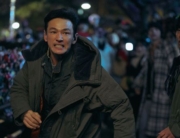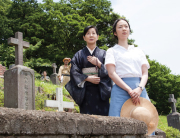Overlooking a misty mountain valley, a young woman sings a beguiling chant that echoes across the hills. “It’s a song I offer to all beings, to all the people,” she later explains to her male companion. “To the animals, the Gods, to all the spirits in our valley.” That’s the pure, open vision that animates Lunana: A Yak in the Classroom, Bhutan’s Oscar submission for best international film. Director Pawo Choyning Dorji’s story of a callow city slicker’s epiphany in the countryside reveals a part of Asia so remote that Westerners and most Bhutanese may never have seen it on screen before. Maybe the isolation is for the best. The lack of worldly distractions helps the young man to rethink his place in life and lets audiences momentarily escape to a rugged and enviably unpretentious community.
Ugyen (Sherab Dorji) is a twentysomething at loose ends, about to flunk out of teacher training college in his fourth year. He hopes that his tuneful guitar playing and English skills will earn him a visa to Australia, but two tough women aren’t buying the dream. His grandmother scoffs at his laziness, and his no-nonsense academic administrator calls him out as the least motivated student she’s ever seen. She scornfully offers him an ultimatum: teach in a one-room schoolhouse in the tiny village of Lunana, a weeklong hike into the mountains, or be expelled from the program. Soon Ugyen resentfully trudges up a steep hillside, accompanied by two cheerful guides whose friendly small talk can’t shake him out of a funk. The trek does not bring out his best side.
Neither does arriving in Lunana. Ugyen is unimpressed. Surrounded by harshly beautiful peaks, the village looks hardscrabble and poor. The village elder who greets Ugyen is cordial enough, but seems beaten down by life. A rudimentary schoolhouse doesn’t even have a blackboard. Ugyen won’t put up with these conditions and announces he intends to leave. But the town’s ragged children are bursting with excitement—these kids who have never seen a car are eager to learn, especially a radiant little girl with a dimple in her cheek (Pem Zam). Reluctantly the young man decides to teach a class and see how the day goes.
Through Ugyen’s eyes, Lunana now tunes in to a rooted energy miles away from doomscrolling and the madding crowd. Ugyen listens to others more deeply. He learns village lore and pauses to savor the nostalgia-inducing taste of food served in a wooden bowl. His relationship with nature gains a new dimension as he grows to appreciate the villagers’ symbiotic relationship with their revered yaks. And he has a ball with the children as teacher and pupils sing and dance together in the gorgeous outdoors. When the time comes to stay or go, Ugyen knows that if he leaves, he will walk down the hill a different person than he was when he arrived.
Director Dorji’s film rolls surely like a pure stream—a slow one. There are no big surprises or shocks, just a sense of growth and peace achieved as a restless mind clears and learns how to let go. Bhutan’s vast landscape overwhelms with its beauty. As the village of Lunana and its people calmly make an impact on Ugyen, Lunana makes one on the viewer. A poignant final scene reassures us of what we (and Ugyen) may have hoped: that when an experience this singular takes hold, you can take it with you.

















Leave A Comment